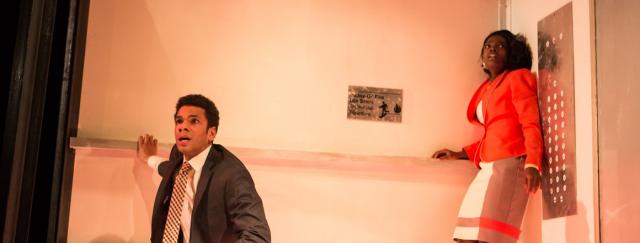
An explosion, an act of terrorism, has devastated the upper floors of a high-rise Manhattan office building, the offices of a large law firm. Two employees find themselves trapped within an elevator that has only one unstable cable holding it from falling. Stuck between the upper floors, the elevator provides a place for its conflicted occupants, previously strangers to each other, to meet and grapple with the choices they have made. The situation for them gets worse when a second explosion sends the elevator plunging down a little further, hurling them both to the floor, but uninjured.
With no active signal from their cell-phones, unable to reach out for help or figure out what they can do, the young, attractive, upwardly mobile African-American co-workers Theodore "Big Time" Southmore (Biko Eisen-Martin) and Tina Pardon (MaameYaa Boafo) are destined to find out more than they probably ever wanted to know about each other as they are forced to confront the very real possibility of a horrifying death unless they are rescued soon.
This play, a Crossroads Theatre production which had its world premiere last April at the Crossroads Theater in New Brunswick, is by popular novelist Walter Mosley, who is most famous for his gritty gumshoe series that features detective Easy Rawlins (Denzel Washington played him in the film version of "Devil in a Blue Dress"). Mosley takes an interesting premise to create suspense and tension. The predicament in which Theodore and Tina find themselves lends itself to exploring how people respond to an emergency. But for dramatic substance, the play allows its two principle characters to both address and reveal certain aspects of their lives they would ordinarily not have the opportunity or the inclination to divulge.
Being trapped for a lengthy period of time in an elevator with someone whose behavior becomes as increasingly unstable as the elevator would seem like a natural set-up for developing an unusual relationship, especially in the light of our having been exposed to two other characters who are introduced and then summarily discarded. Prior to the explosion, you might easily think that a comedy rather than a drama was a-foot. Judging by the giggles that came from the audience during this episode and for much of the dialogue, especially in the play's early moments, it takes a long time for the play to regain its composure.
Before the catastrophe, we are in the company of John Thomas Resterly (Martin Kushner) a senior partner in the law offices where Theodore works, and to Noni Tariq (Shavonna Banks) a sexy, sassy young woman who has become Tina's friend and is part of the secretarial pool within the firm. All four share the elevator for a short period of time giving the white, middle-aged Resterly a chance to give an embarrassing rant that is clearly meant to define him as a racist, bigot, and a class-A jerk. Give Kushner a nod for making us cringe and hope that Westerly's presence is temporary, which it is. Now give Banks a good grade for making clear that Noni is a walking, talking cliché whose every word bespeaks authoritative condescension.
Dispensing with Resterly's recitative and Noni's incomprehensible rudeness to Theodore, our full attention is given to Theodore and Tina, he who is having seizures of some sort at regular intervals and she who is having systematic recurrences of hysteria.
Considering their inherent dilemma, the unlikelihood of a quick rescue and the very real likelihood of a relationship born out of stress, need, and dependence, the play provides the opportunity for each to reveal their backstories, with Tina's more contrived than Theodore's. Are we surprised if a bond is obligatory as they move from contempt to compassion for each other.
Structured as a series of very short scenes that convey the passing of time, the play is at its best as it decodes Tina and Theodore's secret lives. Still, two acts with too many scenes that are more enervating than interesting test our patience. A ten-minute intermission requires us to look at Tina as she examines the walls of the elevator. This, while Theodore cowers in the corner is not a good choice either for the actors or for the audience that doesn't know when it would be polite to get up and go (not necessarily leave but rather go to the restroom).
Climbing the walls is what I suspect some audience members might have considered while Theodore and Tina attempt to get to that meaningful place where their troubled lives are put back into perspective mostly by helping each other. With no help forthcoming for others in other elevators, an implausible suicide is wedged into the plot. The actors, however, perform admirably, under Marshal Jones III's direction and respond commendably to the demands of a script that needs more than some judicious pruning to make its plot and its characters simply credible. We don't need the slight tilt of the elevator, the work of set designer Andrei Onegin, for us to see how in need of basic structural repair is this "Lift."
